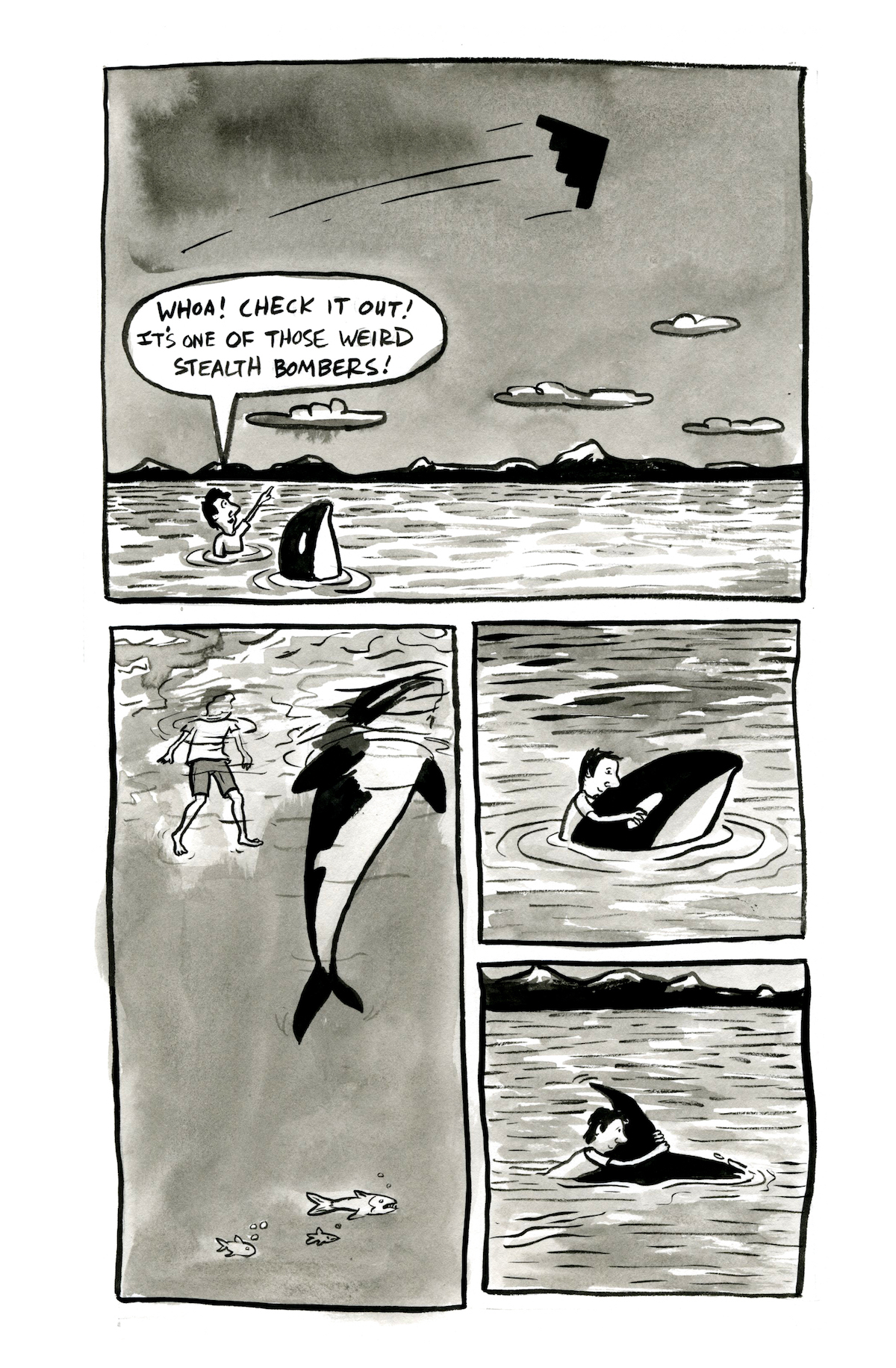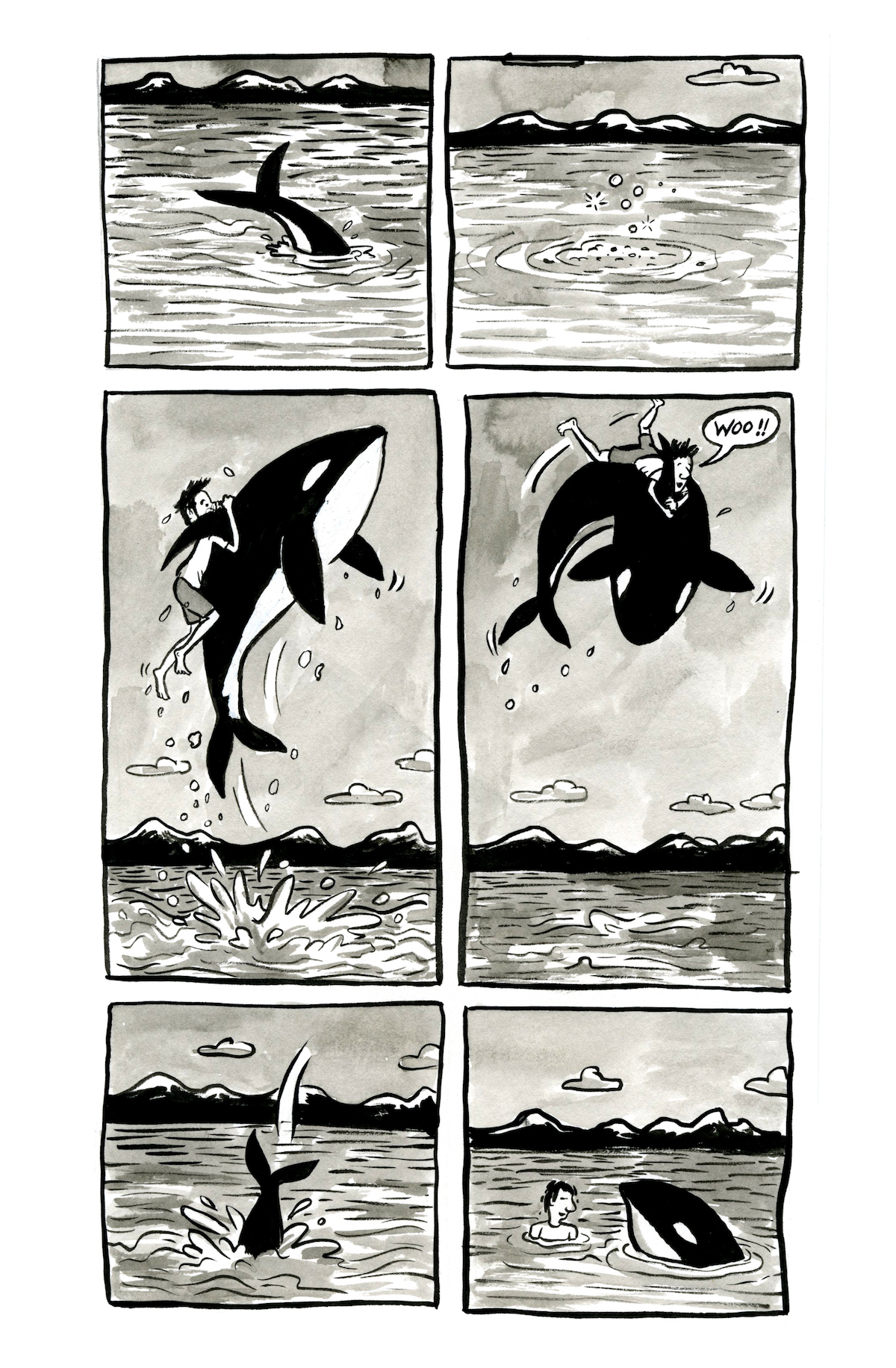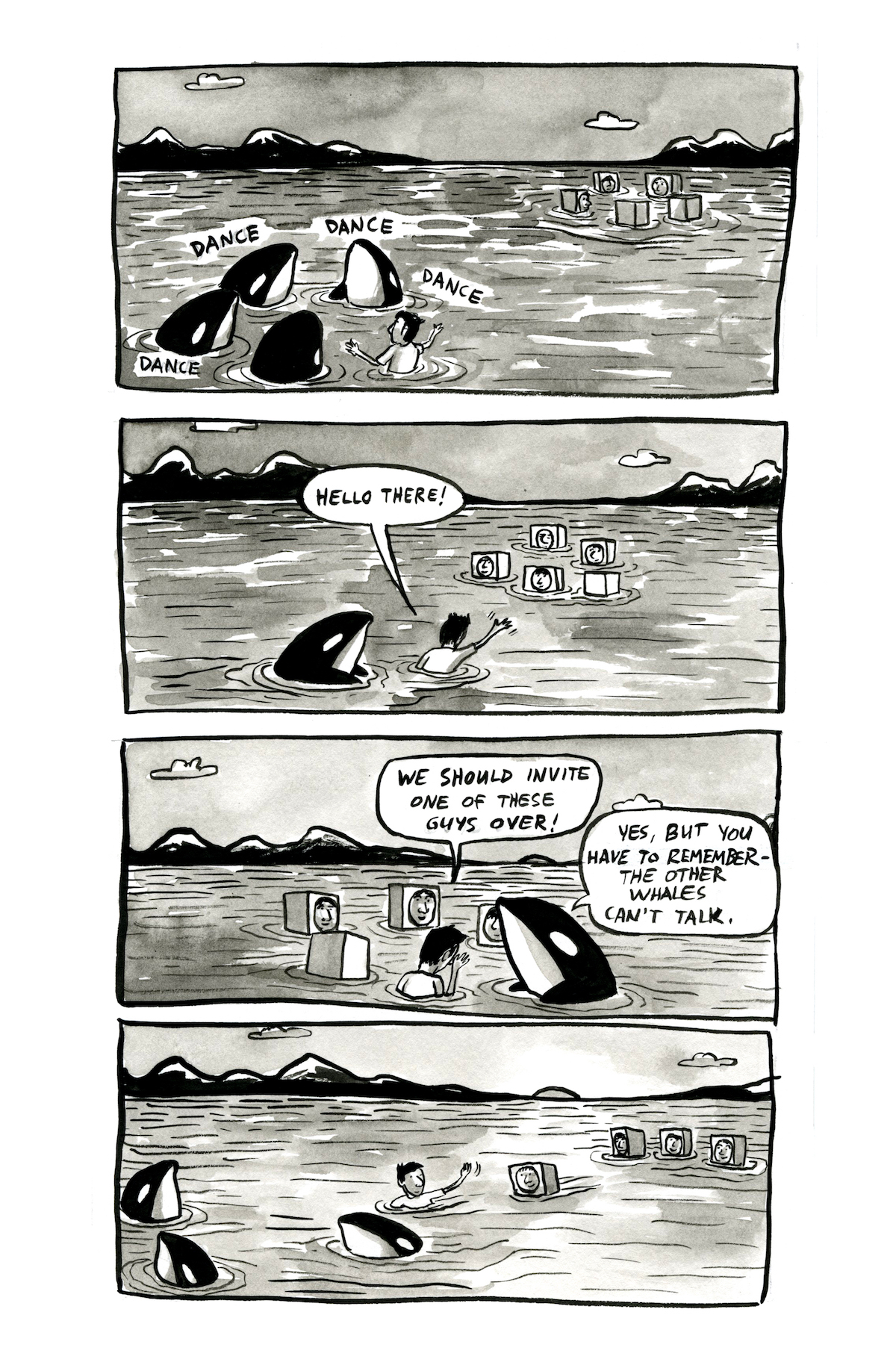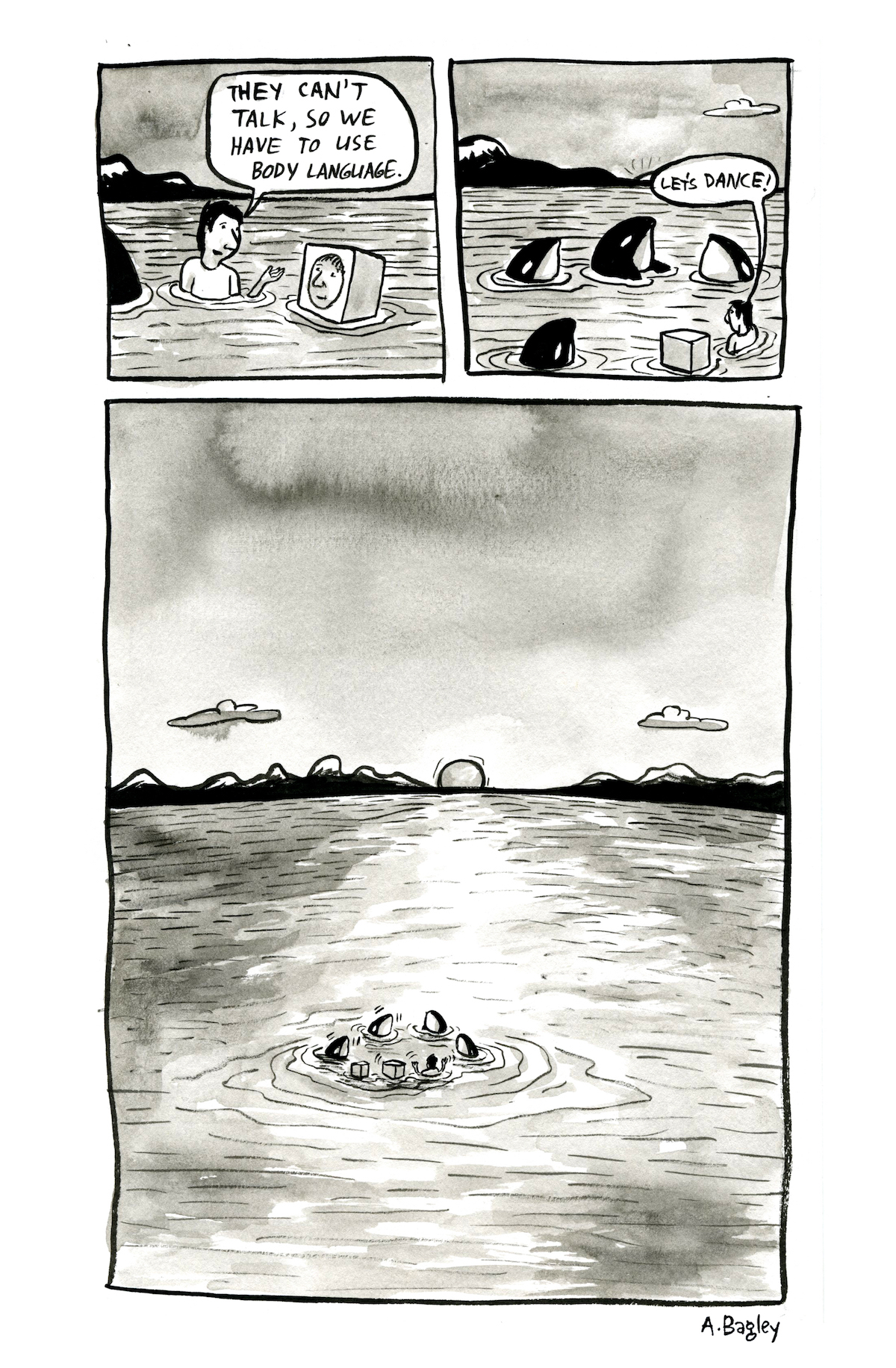How to support an author during launch: A guide for family, friends, and fans
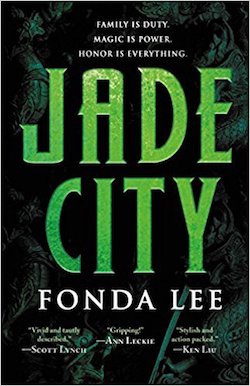
Regardless of whether an author is a bright debut or a seasoned veteran, the experience of finally sending one’s book into the world brings with it weeks (if not months) of excitement, anxiety, and hard work. My third novel, Jade City, will be published this month, and in the frenetic run-up to launch, I’ve been thinking about how much authors depend on our families, friends, and fans during this time — in more ways than you know! Here are some of the ways you can support an author during book launch season.
Go to the launch event if you can. You may be thinking, with trepidation, “Well, if I go, I'll have to buy the book." You don’t have to buy the book! The launch party is a celebration, not a sale. I have a lot of writer friends; my budget won’t allow me to buy all their books. As authors, we're grateful for every sale, but we don't want people to not come to the book launch out of concern that they’ll be expected to spend money. We want to enjoy the accomplishment of publication — and your enthusiastic, supportive presence at events will be remembered and appreciated.
In lieu of buying the book, you can request it from your local library (very helpful to us!), or put it on your holiday or birthday wish list, or — I can’t overstate the importance of this — spread the word to other potential readers. Maybe this book isn’t your thing. That’s fine; we all have different tastes. I don’t expect my book will appeal to all my friends, and I have friends who write books I’m not personally interested in reading. But I try to recommend those books to people I think might enjoy them; you’ll be doing an author a huge favor if you do the same.
At signings, spell your name. Even if it's Jane (and not Jayne, Jain, or Jaine). We'll be so amped-up we’ll barely be able to spell our own names. A quick, unscientific poll on my part confirmed that a great many authors share a phobia of being unable to remember someone’s name at an event and/or spelling a name wrong inside a book. Please alleviate this fear for us.
On a related note, be understanding if we don’t get to talk to each of you for long (or even very coherently) at a signing. We want to! But there's a lot of people and we're a bit frazzled.
For close friends and family: be patient with us during this time. There isn't a single sane author alive who doesn't have an emotional support system in place, so if you're one of those people, bless you. At times, writing and publishing can be a difficult, lonely, and frustrating journey; when it comes to a book launch, an author’s emotions can swing wildly between elation and fear, soaring hope and crushing pessimism. Sometimes we just need someone to listen to our inevitable anxieties or offer a word of reassurance. You might not see much of us during this time, but don't worry — the fuss will die down soon and we'll be back...in front of the computer...
In fact, the fuss dies down so remarkably quickly that it’s easy to get post-book-launch blues. One can spend years writing a book, enjoy a week or two of excitement around release date, and end up with a sense of, “So…that’s it?” A new book gets the spotlight for a short while, but the following week, dozens of other new books will hit the shelves.
Remember that authors and their books need support months and years after release. If you read the book, please leave a review online; it helps other readers discover the book and decide whether to read it. Feel free to express your opinions, but don’t tag the author with your criticisms. Even if you didn’t like the book, remember that it’s a part of someone’s soul, someone's sweat and tears. If you loved the book, by all means, let us know. We like fan mail. We really like it. Every once in a while, an email pops up at the right moment to prevent us from chucking a computer out a window. Long after the book is launched, we never tire of discovering that our words moved someone.
Oh, and we have no control or insight into whether the book is made into a movie. Honest.
Thursday Comics Hangover: An alternative to the alternative
The newest issue of Marvel's The Unbeatable Squirrel Girl is billed as a "special 'zine' issue," which immediately grabbed my attention. I've always been a fan of alternative sensibilities applied to superhero comics — the Coober Skeber "Marvel Benefit Issue" is one of my all-time favorites, and DC's Bizarro Comics trade paperback is a lot of fun, too — and while I haven't read that many Squirrel Girl comics, the character is an appealing meta-take on the superhero genre, and I'd been wanting to read more.
The premise of this issue, laid out in a series of framing pages at the beginning and end of the comic, is that a library was destroyed in a superhero battle, and Squirrel Girl has assembled a benefit zine to raise funds to rebuild it. The comics are supposedly by Marvel heroes and villains, though it's really an anthology of one-and-two-page comics by a variety of cartoonists.
The concept is fine, but the execution is a little disappointing. There's nothing really zine-y about the comic. The creators are, for the most part, mainstream. Hell, Garfield creator Jim Davis is listed as a contributor, and you can't get any more mainstream than Garfield. (Davis's contribution is a series of strips replacing Garfield with Galactus and replacing Garfield's owner Jon with the Silver Surfer. That's it. That's the joke.)

A few of the strips in the issue are very good, particularly a self-help book narrated by a brain in a jar and a short little tone poem from the perspective of Thor's trickster brother Loki. And one strip drawn by Anders Nilson, involving Wolverine and a giant robot, gets the alternative spirit of the enterprise just right.
But I wonder what this issue of Squirrel Girl would have looked like if instead of summoning a fairly well-known ensemble of talent, the editors had gotten the contributors to the newest issue of Seattle free comics newspaper Thick as Thieves, instead?
Marie Hausauer's contribution to Thieves, a bar scene featuring a few trashy patrons hitting on each other, is creepy and true-to-life and beautifully rendered. On the next page, Travis Rommereim contributes a little gag strip about a man who abuses a talking severed head on a chain that taunts him with bad jokes and dares. ("Are you gonna shoot some arrows at me or what?")
Most of the strips in this issue of Thieves seem fairly well grounded in realism. There's a conversation between two young women, and a kid who plays with guns. Gil Rhodes tips things over into absurdity with a fantastic strip about a grandmother who repeatedly gives the worst advice ever, but even that strip doesn't beat you over the head with its surrealism. It's relatively quiet, and it's comfortable with the quiet.
I'm willing to bet that none of the contributors to this issue of Thick as Thieves are dying to work on a mainstream superhero comic. But that's part of the reason why they should have been asked to contribute. Marie Hausauer's Squirrel Girl really would have been an alternative comic to behold.
Can't start a fire without a Spark
Did you know that the good folks at Humanities Washington publish a magazine called Spark? It's true! and the latest issue of Spark is now online in PDF form. In this issue, you'll find a new poem from Sherman Alexie, a history of Washington literature as told in 14 books, a discussion of the long history of fake news, and a new short story by Spokane author Jess Walter. It has a fantastic first sentence:
Your goddam kids wanna send you to the booby hatch?
Go read. And support Humanities Washington when you can. They do good work in support of storytellers in Washington state, and they help bring exciting new work into the world.
Mystery lovers: don't miss out on the big sale this weekend
If you're a mystery fan, you're likely still stinging from the loss of Pioneer Square's Seattle Mystery Bookshop. But you should know that this Saturday you'll have an opportunity to find some great deals on mystery novels while also supporting the Friends of the Seattle Public Library.
From 9 am to 5 pm at the North Seattle College, the Friends of the Library will host their holiday "better" book sale, which features "like-new" books that make for great gift opportunities. The thing that makes this sale extra-special is that before they closed, Seattle Mystery Bookshop donated a significant part of their collection to the Friends. You'll find a lot of that collection at this sale.
If you're feeling selfish and want to keep the books for yourself, that's okay, too. Books start at $3 a pop, and it benefits a great cause.
Talking with Nic Low about literature and the outdoors and a cultural exchange with Christchurch
Last month, New Zealand author Nic Low came to Seattle for almost two weeks as part of an ongoing native author exchange program facilitated by the Seattle City of Literature organization. As part of Lit Crawl, Low appeared onstage at the Hugo House with Seattle author Willie Fitzgerald. The morning after Lit Crawl, he met with me to share his thoughts about the trip, and how Christchurch and Seattle could grow together as literary cities. This interview, obviously, took place before Seattle was named a UNESCO City of Literature, but that designation makes Low's thoughts on a cultural exchange even more relevant.
So you've been here for ten days. What are your impressions? What has your visit to Seattle been like?
Well, I'm still on a good high from Lit Crawl last night. I'm always excited when a whole city comes out — whatever the event is, something that draws a whole lot of people out into the public space. Because writing often happens behind closed doors, publishing happens behind closed doors. It's not always a particularly public art form. So when you get something like Lit Crawl, it's really exciting.
I loved going to see [Claudia Castro Luna’s] Poetic Grid [presentation]. I loved hearing all the different poets read, and seeing the photographs and the maps correlated. I've been hiring the Spin bikes and also walking everywhere, to get a feel for the geography. So to then overlay that with poets’ impressions of that geography was really enriching. I enjoyed that a lot.
I also loved the Jack Straw Writers who were on before that. Really cool to see a - I was going to say a younger generation but that's not right, because they're really from all different generations. But the Jack Straw Fellows are doing some really exciting work.
We had a lovely catch-up with the Jack Straw Writers a couple of days ago, and they shared stories of what they're working on. I was super-impressed with the diversity of that group — a really broad range of perspectives: people writing about their personal experiences growing up; people writing about experiences of being native but not living on your home territory; people writing about sexual violence; people writing about a whole range of different topics, but all from really beautifully crafted points of view. I like getting down and soaking those kind of things up.
Another real highlight has been connecting with various different First Nations groups here, and sharing stories with them. I'm Ngāi Tahu — I'm Maori — and that's a very big part of who I am, what I write. So to hear some of the stories and the histories from people who've been here six, eight, ten thousand years is really exciting.
I went down to Tacoma for an event down there. They’re touring a totem pole around the Lummi Nation in solidarity with the fight against various fossil fuel projects. And I met a wonderful writer, Rena Priest, who's a Lummi woman, and she'd written a piece specifically for that occasion. Really great to connect across those cultural boundaries as well.
You also skipped up to Vancouver?
I did. It's a bit of a stupid way to organize a schedule, but it's entirely my fault from just saying “yes” to everything. I had an event in Vancouver not last night but the night before. And then I've got another event in Vancouver tomorrow. So I'm going back to Vancouver on the first plane tomorrow morning.
So you've been south, you haven't been all the way down to Portland, but you've been to Tacoma, you've been up to Vancouver. Does it feel like a region in your brief experience, or is the national border significant to you?
I sent a photograph back to my partner back in Australia at the point where we went across the border and we just had a view of ocean. And I sent her a message that said ‘Canada to the right, America to the left.’ It's just ocean! These lines are always mildly arbitrary, and I think the arbitrariness of that emerges when you are hanging out with First Nations people, whose territory boundaries have no relationship.
I mean, they obviously have a very important relationship to that national boundary now. But predating European settlement, the fluidity — or just the different tribal territories, and the overlap and the trade — seeing the shared knowledge between indigenous people up and down that coast? There's a real familiarity to that.
I've been watching the weather patterns very closely and seeing if I can get myself into the hills at all. We got one day hiking in the Cascades, which was lovely — you can sort of see that coastline, the consistent vegetation. I know, from the map and from photographs sort of what the geography looks like. But it's basically been raining the whole time —
Yeah, it has.
So we haven't seen so much of it.
It's appropriate. It's seasonally appropriate.
The book I'm working on, as you know from the talk last night, is the history of mountains in New Zealand. And I really was, and still am, keen to get up into the mountains as much as possible here. But my crampons haven't got much of a workout yet.
They're intense. I'm from the east coast — I'm from Maine, which is other corner — and the mountains here are much more impressive than they are there.
I did catch one glimpse of Rainier out there, sitting proud. It's like a magnet to me. I was like, 'I want to go there.' But it wasn't possible.
It's very impressive. And it’s a volcano, too, so in a lot of ways it could just as well be our death on the horizon. At some point we could be Pompeii.
Oh wow. A fossilized Seattle. Just everybody caught with their lattes in one hand, with their phones in their other hand.
Yeah. People of the future wouldn't be able to tell your fossil from a Seattleite, with the coffee cup in your hand.
No they wouldn't. And I think that is one of the interesting things. I travel a lot and you do, on the one hand, brace yourself for strangeness and difference, but on the other hand you often find similarity and connection.
There's such commonality in culture now. We read so much that comes out of America. There's such great cross-influence in terms of media, in terms of internet, in terms of the technologies that now guide our lives.
I’ve certainly been struck by the degree of homelessness here.
I guess also there are some differences. I’ve certainly been struck by the degree of homelessness here. That stands out like a sore thumb, and it has made me feel pretty uncomfortable. It's confronting. It's really confronting to see that level of poverty hard up against this level of wealth. I guess I'm used to that level of poverty in very poor countries, but not in the rich countries.
Yeah. It's gotten out of control in the last ten years. I mean, it's always been there, but it is something that this city has not been responsible in keeping up with.
Yeah. It's a whole another long and complicated conversation.
I'm certainly curious to know how those demographics have shifted, of who constitutes the homeless. Because you have your stereotypical people, and then I've seen a whole lot of people who don't fit the stereotype. I've seen lots of people who look like they might not have been on the streets for that long, or have come from a whole range of different backgrounds.
It's certainly eye-opening in that respect.
There’s a study that found when the average rent in a city increases by $100, the homelessness population increases by 15 percent.
Seriously? That's the correlation?
Yeah. So you are seeing people who you would not normally see as homeless, because they are not ordinarily homeless.
Gosh that's a thin line, $100. That's a very thin line.
Yeah. It is a very thin line. It is the first thing that a lot of visitors notice and we have to do something to help. But to bring it back to books: So Seattle has several sister cities. Reykjavik, is one, and we have a pretty good cultural exchange going with Reykjavik. What do you think that the relationship between Christchurch and Seattle could be or should be? What do you think we have to learn from each other? It's a big question, sorry.
It's a big question, but a couple of immediate things spring to mind. The first one is what we talked about before with the Seattle Poetic Grid. I can see the usefulness of that, obviously, in the context of the literary exchange. And to bring writers back on a regular basis, to be mapping each other's cities, to be providing outside viewpoints.
I really like the idea of locals learning from visitors, and visitors learning from locals. There was one poem in the Grid that was from someone who'd been in the city for 24 hours, and it was an observation of tents under a freeway. Interesting that that was what struck him, or her.
We've been talking about a few different potential models. One thing is perhaps to have writers go in pairs. Imagine that I come back next year and bring another writer with me, and we do a project. And then the next year, that other writer comes back and brings someone new with them in a kind of an iterative process, so that they can make introductions and show people around, and vice versa. So get Elissa [Washuta, who visited New Zealand as a Seattle author through this program last year] back to Christchurch and get her to bring someone with her, and just roll it on that way.
Another area that immediately springs to mind is our relationship with the outdoors. Christchurch is really an incredible gateway to the mountains. An hour’s drive, you're in the snow, you're on a ski field, you're strapping on your crampons, you're ready to go. A couple of hours and you're in the absolute heart of the Southern Alps. So mountain culture, rock climbing, mountain running, mountain biking — all these things that you guys love, are absolutely alive and well in Christchurch.
I suppose this is sort of the work that I've been doing. I've been doing so much around place and wilderness and outdoors, but from a cultural and literary point of view. I'd love to see some kind of program that combines taking people into the outdoors and exposing them to the literature of the outdoors.
Like a kind of mountain writing festival perhaps, that happens in Seattle one year and in Christchurch the next. And then maybe the events take place somewhere in the mountains, or maybe it's a series of trips with conversation while walking, writers out on the trail discussing various different ideas about place and belonging.
You've already mentioned that you’re working on a non-fiction book about mountains. Can you tell me a little bit about that?
I grew up in the mountains. In all of our spare time we got taken up what we call tramping, what you would call hiking. The Southern Alps were a really big part of my dad's youth. He's always loved the mountains, and so when we were old enough to carry our school bags up, we went. And that really runs in the family. My whole extended family on dad's side are very much mountain people, and I knew the stories and the histories.
On my mother’s side, we are Ngāi Tahu, and we are more often than not thought of as coastal people. I knew the histories in the stories of the plains and coasts, but I didn't really know what our associations were with the mountains.
So I wanted to write a book that put those two things in dialog, my European heritage of mountaineering and climbing and exploring, and my Maori heritage of — whatever that looked like. I didn't really know what that looked like. But I assumed that, because hundreds upon hundreds upon hundreds of those rivers, peaks, valleys — they're all named. So if they're named, people knew them, there would be stories associated with them. I set out to try and find what those stories were.
Fast-forward three years, and I would spend a very long time in those mountains. I've done 15 long-distance journeys though the Alps. I'm going to write about ten of them. They're the pre-European routes we used for trade, for exploration, for family visits, for warfare. There’s a lot of mythology, our creation stories. It’s very, very central to our sense of identity and place.
There's a lot of books out there that talk about wilderness. We have a great fascination with explorers. But often the people that were exploring had guides; more often than not, they were guided. The places that they were discovering were all known, they were named. They were celebrated in long and deep histories. So I want to bring some of those histories to the surface, and I'd like to write this book in a way that gets people excited about both sides of those histories, so that when they go out into the mountains they see that overlay. They know who was here, what they were doing and why, and they understand the names that are on the land.
Book News Roundup: Don't forget to vote
- Seattle author G. Willow Wilson just announced her second novel:
My second novel, The Bird King, has been sold to Grove/Atlantic. You’ll be hearing a lot more about it from me in the coming months, so for now I’ll just say this: it’s set in 15th century Spain and those of you who’ve been pining for more genies ought to be pleased.
This is pretty cool: Hugo House and the Poetry Foundation are joining forces with poet Natalie Diaz to put on a series called "Poetry Across the Nations, a new community outreach program facilitated by Native women, on December 6–8." The series will eventually move to South Dakota and Arizona, but it starts here first. Events include poetry workshops for the Squamish community and indigenous writers, as well as a reading of indigenous writers at FRED Wildlife Refuge on Thursday, December 7th. We'll have more information about the series in the coming weeks.
The Seattle Office of Emergency Management has a book club! Tomorrow night, they're meeting at the Rainier Beach library to discuss Sheri Fink's excellent account of a hospital during Hurricane Katrina, Five Days at Memorial. You can RSVP for the book club right here.
For god's sake, people: vote! Get your ballot to a mailbox or a drop box today. If you need guidance on the issues, here's a great meta-cheat-sheet that incorporates all of the local endorsements.
Knowing and doing and the passive sin of hipster privilege
Published November 07, 2017, at 11:55am
John Hodgman reads from his new book Vacationland at the Neptune on Friday, November 11th. His new book desperately wants you to know that he's rich and he's white and he's famous and he feels very, very bad about it.
Finale
It was hours and then the end is almost over.
Velvet curtains all in rustle at the borders
of the stage. Our eyes are dry, our knees numb,our temples dull. Nothing is left to be begun:
No tearing at the breasts of hairdoed birds,
no smooth unscrolling of the Italian wordsfor love and loss. No garden froth, no castle wall
to knock the sword against, no impossible
extension of the slenderest ankle in its arc.The lights on stage will dim and so we feel the dark,
feel how the real — real sex, real pain, real meat —
awaits us in the car. We feel the purses at our feet.Onstage the voices call but we are half-
way back to home by now, numbering the claps,
saying the bravos that we hope are minimum.We are adding up the babysitter's sum.
We are watching for the last breath of the lover.
We forget to be the ones who don't recover.
Publish beautiful books with Third Place Press

Sponsor Third Place Press is back again this week, this time to talk about their first-rate book production studio. If you're a writer thinking of self-publishing, check them out: They're home to the only Espresso Book Machine in the Pacific Northwest — she goes by "Ginger" — perfect for printing your own work. And they provide a range of production support, helping authors create books that are professionally (and elegantly) designed to fit the content. Our sponsor page has a full description of their offerings.
Sponsors like Third Place Press make the Seattle Review of Books possible. Did you know you could sponsor us as well? If you have a book, event, or opportunity you’d like to get in front of our readers, send us a note. We’d be delighted to reserve a spot for you.
Your Week in Readings: The best literary events from November 6th - November 12th
Monday, November 6th: Patty Schemel
Schemel is best-known for her years playing with Courtney Love’s band Hole. Her memoir Hit So Hard is about addiction and punk rock and what it’s like to play with a thousand different bands but to only get questions about the one with Courtney Love. Elliott Bay Book Company, 1521 10th Ave, 624-6600, http://elliottbaybook.com, 7 pm, free.Tuesday, November 7th: Cycling the Pacific Coast Reading
Bill Thorness is a Seattle author, but he gets around on his bicycle. In fact, he’s traveled the entire 2000-mile journey from Canada down to Mexico. His new book offers tips and tricks and itineraries for aspiring Pacific Coast bicyclists. If you’re not looking to travel the whole 2000-mile trek yourself, Thorness also offers shorter trips of a few days or weeks. Basically, the book covers any level of bicycling proficiency, from beginner to expert. University Book Store, 4326 University Way N.E., 634-3400, http://www2.bookstore.washington.edu/, 7 pm, free.Wednesday, November 8th: Chief Seattle and the Town That Took His Name Reading
See our Event of the Week column for more details. Seattle Public Library, 1000 4th Ave., 386-4636, http://spl.org, 7 pm, free.

Thursday, November 9th: Images of the West Reading
Down from Edmonds, photographer Randall Hodges shares photographs he has taken while wandering around the western portion of North America. Hodges will share tricks of the trade and explain why the west is his muse, and not the east. (Though that last one is pretty obvious to anyone who lives in Seattle: the west is dramatic and beautiful; the east is worn-down and exhausted.) Third Place Books Lake Forest Park, 17171 Bothell Way NE, 366-3333, http://thirdplacebooks.com, 7 pm, free.Friday, November 10th: Fresh Complaint Reading
Jeffrey Eugenides is a stone-cold genius writer of novels. If you haven’t read Middlesex, you’re missing one of the finest American novels of the last twenty years; you’ll likely be hooked from the very first description of a fire tearing along a waterfront. Tonight, Eugenides breaks a long silence with a short story collection titled Fresh Complaint. He appears in conversation with Mary Ann Gwinn, who is no longer the Seattle Times book editor but who is still one of the city’s foremost literary experts. Seattle First Baptist Church, 1111 Harvard Ave, 652-4255, http://www.elliottbaybook.com/, 7 pm, free.Saturday, November 11th: Open Studios 2017
Once a year, 1426 Studios, an art studio in the International District with three floors full of artists, opens up its space to anyone who wants to be a lookie-loo. This time around, they celebrate their annual event with a new storefront gallery. This is especially noteworthy because Seattle Review of Books columnist Clare Johnson will be showing work. Go and check out her stuff in person and tell her how much you enjoy her Post-It project.
1426 Studios, 1426 S Jackson St, http://www.1426studios.com/, 3 pm, free.
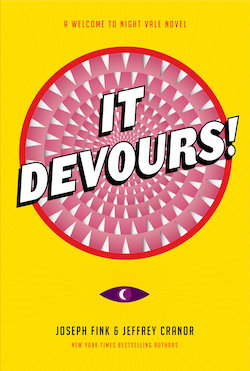
Sunday, November 12th: It Devours! Reading
Welcome to Night Vale is a podcast that revives some of the old-timey thrill of radio serials. Tonight, co-creator Joseph Fink will put on a little show to celebrate his latest Night Vale novel, It Devours!. This book, it must be said, has a FANTASTIC cover. University Temple, 1415 NE 43rd St,634-3400, http://www2.bookstore.washington.edu/, 7 pm, $21.99.What we saw (and loved) at Short Run
This report was written by Paul Constant, Martin McClellan, and Dawn McCarra Bass.
Last year’s Short Run Comix & Arts Festival was the weekend before the presidential election, and most people we talked to about it can only recall the convention as a blur preceding one of the worst weeks in recent memory. Perhaps for that reason, people seemed extra-ready to have a doubly good time at this year’s Short Run. Unlike the averted eyes and tense political conversations of last year, everyone we spoke with on Saturday seemed happy and ready to have fun.
One of the best parts of any Short Run is witnessing the supportiveness of the comics community in action. We found a bunch of books through the recommendations of Seattle comics stalwarts. Fantagraphics PR guru Jacq Cohen directed us to Perfect Discipline and Unbending Loyalty, a gorgeous comic from Tommi Parrish published by Perfectly Acceptable Press, a risograph publisher out of Chicago.
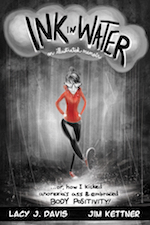
We also checked out work by Rebecca Artemisa, the recipient of the 2017 Dash Grant — a booster grant from Short Run. Weepy is a tribute to La Llorona ("the crying woman"), the anti-heroine of a ghost story about a mother who drowns her children and herself in rage at a husband's infidelity, then haunts the river in grief. The tiny book, a retablo as story, is boisterous with color and movement. Panels flourish in all shapes and sizes, bordered with flowers and leaves, birds and snakes, stitches and braids (Artemisa joked that it was her first "real" comic — you know, with boxes). Both playful and serious, the tone is dead-on for transforming a story about shame and fear into something much bigger.
We stopped by the booth for local minicomics store and art gallery Push/Pull only to find a new anthology titled Push/Pull: Collective Conscience featuring past and present members of the gallery. Push/Pull cofounder Maxx Follis-Goodkind told us it was the first product of a new press bearing the Push/Pull imprint. We can’t wait to see what’s next from the Ballard gallery/shop/school/publisher/collective.
On a whim of presidential curiosity, we picked up That Time I Met Bill Clinton…and He Stole My Favorite Pen! and Cats of the White House: Ten True Tales of Presidential Pets from Portland cartoonist Rachel Scheer, who works under the pseudonym Rachel Comics. Bill Clinton is an autobiographical account of a visit to the White House during the first Take Your Daughter to Work Day, and Cats seems to be a spiritual sequel to that book’s fascination with Socks, the Clintons’ cat. Rachel’s simple illustrations and trivia-nerd enthusiasm for the theme adds some humanity to the idea of presidents. The thought of Abraham Lincoln seeking comfort from his cats in the darkest hours of the Civil War is heartbreaking and tender and well worth the price of admission.
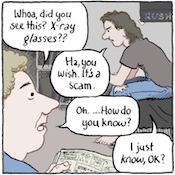
Laura Graves obviously has so much fun making her comics. They’re all set in a demonic other-world, but the short Butts2Butts (which, like a single, is b/w another story Chopping Block) is a hilarious and weird story of a couple freezing together in bed, who awaken a demonic portal when they decide to sleep butt to butt. We also picked up her Witches Get Stitches, and an issue of 666 Bistro, which we thoroughly enjoyed.
We used this year’s Short Run as an excuse to catch up on some of the cartoonists who were instrumental in the Intruder comics newspaper. Most of them had new stuff to show off at this year’s festival.
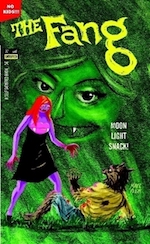
Palm also brought a newspaper-style zine documenting that time he broke his drawing arm and taught himself to draw with his non-dominant left hand. With plenty of photos of the pins in Palm’s arm, as well as a ton of sketches documenting his progress, artists will likely find How to Become Ambidextrous In One Easy Fall to be an inspirational document.
Heads Will Casserole, a new comic drawn by Marie Hausauer and written by Ben Horak, begins with a couple meet-cute-ing at a butcher shop. It’s a scene that wouldn’t be out of place in a romantic comedy, even with the lingering shots of bloody beef being hacked to pieces. But then the book descends into a monster-movie farce, with the couple’s romantic dissolution taking the form of a giant monster eating the guests at their dinner party.
Tom Van Deusen’s The Big Me Book is an autobiographical comic about a fictionalized version of Van Deusen (or at least, with its Nazi jokes and its wild egomania and misogyny on display, one hopes it’s a fictionalized version). Nobody makes fun of unselfconscious self-aggrandizement quite like Van Deusen, and this comic — which includes a magical cat and a very funny visual gag about thought balloons — demonstrates a whole new level of cartooning ability.
It wouldn’t be a Short Run without picking up the latest Bug Boys comic from Laura Knetzger. This new one, issue 15, finds Stag-B and Rhino-B on a trip to a bug literary convention in the big city with their friend Dome Spider, the grand librarian. The poor beetles are overwhelmed by the big city. As always, it’s the small observations that make this charming comic so fascinating — details like the boys encountering alcohol in the restaurant, and being told their small town had banned it. Or finding out the metropolis is, in fact, in a human garbage dump. Dome Spider loves being in the city, and the overwhelming wide-eyed bug boys get to see the scary world through her appreciative eyes, and process their feelings about it. We wish Bug Boys were taught in every classroom, but like the best of all things that are either made — or appropriate — for kids, reading as an adult layers in a whole new kind of depth to their experiences.
Lawrence Lindell gave us the option of a number of covers for his xerox’d zine-comic Couldn’t Afford Therapy So I Made This. He hand-drew each cover, so each was unique. The comic explores his inner voice in processing mental health issues, and how being black layers a different meaning over mental illness. Lindell is acutely focused on presenting positive attitudes and uplifting messages to black audiences used to confronting negative associations in our media, while looking straight into the kinds of questions and inner arguments that come from dealing with difficult times. He’s expanding this piece into a full book, and we think his mission is a great one worth supporting.
We bought two pieces from Daria Tessler, Three Magical Recipes From the Book of Secrets of Albertus Magnus, and Living Sculptures for Home and Office. These gorgeous risograph comics (from the aforementioned Perfectly Acceptable press) are incredibly tactile — the printing colors are bright and the ink lays on the nice paper stock in thick slabs. The front of Living Sculptures also has a foil stamp — it’s fair to describe these as super-graphic, every page akin to a luxurious poster. The stories evoke ornate mysticism, and are so much fun to read that we found myself putting them down, then picking them up again immediately to spend more time with.
We love an existential crisis, and several artists this year represented the dark void of the human soul exceptionally well.
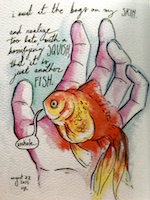
Flipping through Jessica Hoffman's you are here is dizzying. Printed with images from Google maps and found surveillance footage, the slender booklet feels vast, using color washes and cutouts to create a sense of rapid movement between sky and earth. Hoffman (who co-manages Paper Press Punch) has an ongoing concern with electronic surveillance and what it shows and hides. you are here demonstrates how a digital map can show incredible detail about where you are and still leave you very, very lost.
It's not impossible to get Cole Johnson's attention, but it's not exactly easy, either. When we first passed his booth, he was heads-down inking on what looked like old-school lined notepaper. That hand-drawn style, almost childish, is the right fit for his mopey-in-the-best-way storytelling, where life is all dirty blues and greens, and success — financial, romantic, social — is always just out of reach. Keep an eye on it, though: the way scenery and characters move within the delicate panel boundaries is extremely sophisticated. A lot of craft went into these delightfully downtrodden pages.
Jessie and Jaya Nicely put out a luxuriously beautiful culinary/culture magazine called Compound Butter, and we picked up issue #4, which centered art, articles, recipes, and interviews around the idea of the word "Rotten." Jessie is editor-in-chief, and Jaya is art director, and it is clear the amount of time they put into making each issue. The closest analogy would be a less frivolously quirky Lucky Peach combined with Slow Food, but with an eye towards inclusion and diversity of culture, and thought. We had a nice chat with them about where to eat around Seattle (they, unsurprisingly, already had some good places picked out), and after spending some time with this issue, I’m definitely going to want to discover some others.
Amy Burek, founder and sole member of the Awkward Ladies Club, has a sharp eye for the Internet's ability to tell us awkward truths about ourselves. It was almost impossible to choose just one from titles like Dad Tweets: Collected Tweets from 2009 to 2013 and Never Dates Dudes From the Internet: Responses to a Craigslist F4M Ad. We finally settled on her newest, Is This Normal? The Search for Pregnancy and Parenting Advice on the Internet, which reprints questions posted to the interverse with intense anxiety and hope by expecting and new mothers. No question could be more quintessentially human, no human condition more fraught with concerns both trivial and mortal, and Burek's careful selection is hilarious and poignant.
Michael Sabine Rear writes with piercing accuracy about disability. She's read at the Comics and Medicine Conference, and her Bending Spoons: A Field Guide to Ableist Microaggressions provides a valuable self-check for the well- (and not-so-well-)intentioned alike. Her latest is Reverse Flâneur, a minicomic memoir about traveling in Austria. The multiple layers of inversion here are irresistible: a blind illustratrix drawing what it's like to be viewed as disabled — what it's like to be viewed, as a disabled person whose disability is one of vision — what it's like to be viewed, as a visually disabled person who is obsessed with dressing in style and oh, by the way, a hyperintelligent art theory geek. If that makes your brain hurt, trust us, it's in a good way.
You can’t have a big one-day festival of comics without a little tiny bit of regret, so here are some of ours: One of us wishes they'd actually gotten up the courage to tell Julia Wertz to her face how much we love her comics. SRoB co-founder Paul Constant wishes he’d done a better job of handling the panel conversation with comics geniuses Emil Ferris and Leela Corman. A tighter moderating grip would’ve pulled the two cartoonists into a conversation for the ages. Instead, he left them adrift, though Ferris’s references to time travel and to the idea of our spirits living onward in artificial bodies designed to look like old movie monsters were definitely worth our time. We didn’t pick up anything new from Coin-Op comics, the brother-sister act that blew our minds a couple Short Runs ago. We didn’t give short story writer Stacey Levine a tweet to turn into a short-short story. We didn’t get to say hi to all the amazing people we wanted to say hi to. And we didn’t participate in nearly as many of the Short Run satellite events that we’d hoped to.
But regret is an organic part of all this. Short Run is, by design, too big for any one person — or group of three people — to experience in its entirety. And in fact this Short Run was bigger than it’s ever been. Hopefully next year’s Short Run will be bigger still. (We heard a lot of folks talk about how they wished Short Run would become a two-day festival to give people more time and opportunity to experience everything. We endorse that sentiment.)
It’s a real testament to Short Run founders Kelly Froh and Eroyn Franklin that so many people want to take part in this thing they’ve created. This festival, which started as a tiny little get-together in the Vera Project less than a decade ago, has doubled and tripled in size while staying independent and inclusive and ferociously creative. It draws artists from up and down the West Coast — and beyond — and is a new home for the independent publishers that lost a showcase when the APRIL Festival announced its closing this year.
In virtually no time flat, Short Run has gone from “let’s put on a show” to “this is the heart and soul of Seattle’s creative community.” Imagining a Seattle without a Short Run is as unthinkable as a Seattle skyline without a Space Needle.
Event of the Week: Chief Seattle and the Town that Took His Name reading at Seattle Public Library
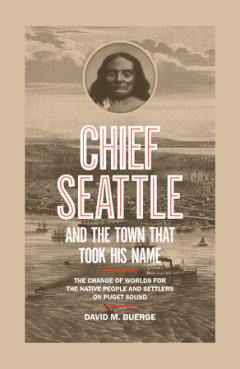
David M. Buerge’s Chief Seattle and the Town That Took His Name is billed as “the first thorough account of Chief Seattle and his times,” a “comprehensive story” of the colonization of Seattle that Buerge has supposedly been working on for two full decades.
So why has it taken so long to finally get the biography that Chief Seattle deserves? For one thing, many of the accounts are contradictory and passed down orally from generation to generation. For another, our writers have not always been interested in being fair-handed in their coverage of native history.
This is a book that tries to make peace of the many disparate accounts of this city’s namesake. Was he a common descendant of slaves, or was he a noble king? Which of the accounts of the founding of Seattle — if any — should we believe?
Buerge’s account tracks all the way back to the first flirtation of white America with the lands of the Pacific Northwest. Americans were drunk on the insanity of Andrew Jackson, and our nation’s bloodlust was reaching bold new heights. It’s a story of war and disease and dishonor and regret. In other words, it’s an American story.
On Wednesday, November 8th, Buerge will discuss his book with Duwamish Tribal Chair Cecile Hansen and Nile Thompson, a native languages expert, in a conversation moderated by Town Hall and Seattle Weekly founder David Brewster. The incorporation of Hansen and Thompson into the event is important; it would have been easy, twenty years ago, for Chief Seattle to be another Eurocentric story about the white men who "invented" the land on which we all live.
We expect more thoughtfulness and more inclusion from our history books now, and that’s as it should be. With this book Chief Seattle gets maybe his first shot at a full and fair examination of his legacy since the first white settlers showed up. That makes this a significant moment in Seattle history.
Seattle Public Library, 1000 4th Ave., 386-4636, http://spl.org, 7 pm, free.
The Sunday Post for November 5, 2017
Each week, the Sunday Post highlights a few articles good for slow consumption over a cup of coffee (or tea, if that’s your pleasure). Settle in for a while; we saved you a seat. You can also look through the archives.
To the Lady Who Mistook Me for the Help at the National Book Awards
Poet Patrick Rosal issues an epistolary rebuke to a woman who took him for a server at a black-tie event, in a series of letters addressed to a subtly shifting cast of one — “Dear lady,” “Dear Miss Lady at Fancy Table 24,” “Dear ___ ” (we both know who you are). Out of the shock of that mistake, Rosal draws a compassionate essay on how style and dignity intersect, and how very little expensive fabric and brand names have to do with either.
Surely, by the way you crane your neck forward and to the side, stepping slightly left into my path just enough to intercept me, I must know you from somewhere else, right? I lift my chin a little to see if I can link a name to your face. And surely you think you know me too, don’t you? I’ve traveled only from the other side of the room to walk toward you and for you to walk toward me. But doesn’t something break just then, when you and I approach? All the festive shimmering in the space. These eyes. This face. I think I’m even smiling now, when you point back at your seat to tell me you need a clean linen to dab the corner of your mouth. You need a knife for the beef cheeks. A refill of your cabernet. Maybe you need me to kneel down and shim one of the table legs to keep it from bobbing.
So this is how you and I have been walking toward each other maybe this entire time.
Bear, Bat, or Tiny King?
There’s a romance to the Rorschach that no other personality test can match — not the Myers-Briggs; not the Minnesota Multiphasic Personality Inventory, as sexy as it sounds; certainly not the myriad quiz memes that plague social media (House Slitherin, thanks for asking). No: it’s the Rorschach, the psychiatric test that spawned an antihero, that’s the warped and inky mirror of our souls.
Reviewing The Inkblots by Damion Searls, Deborah Friedell takes a tour of the test’s history, from the Swiss psychiatrist who created it “when he was bored during the First World War” to the problems of interpretation (“teenagers … too often came off as insane”) to the test’s use as a way to out gay men, “gauge the character” of foreign people, and provide final proof that women do go crazy on a lunar cycle. Huh. Maybe the test — at least, how we used it — tells us something about ourselves after all.
In horror movies, serial killers successfully feign harmlessness by claiming that all they see in the blots are butterflies, certainly not piles of female corpses. In the great Olivia de Havilland movie Dark Mirror – she plays good and evil twins — the test is all about Jungian archetypes. But for the actual test — this is the sentence that Rorschachians always repeat — ‘what matters isn’t what you see, but how you see.’ A few ‘content’ answers would later come to be thought significant: ‘food responses’ indicate that a person is ‘unusually dependent’ in relationships; a lot of sexual responses point to schizophrenia. But of more importance is whether an answer is judged to have ‘good form’ — ‘whether it could reasonably be said to describe the actual shape of the blot’ — as determined by Rorschach’s own sense of things, and also by responses from other ‘normal subjects’; he doesn’t say how he determined that those subjects were normal.
The First Woman to Translate the 'Odyssey' Into English
Mary Beard has demonstrated — at great risk to her (fortunately thick) electronic skin — that women have quite a bit to say on subjects one might think long-tapped-out by generations of male scholars. Now classicist Emily Wilson is breaking a gender barrier on our side of the pond: she’s turning a woman’s eye to the one of the best-known heroes of the Greek classics.
Of 60 English translations of the epic poem, not one of them is by a woman. Wyatt Mason does an excellent job of outlining exactly why this new translation and the gender of its author matter. I look forward to the academic feather-fluffing that’s sure to follow.
Throughout her translation of the "Odyssey," Wilson has made small but, it turns out, radical changes to the way many key scenes of the epic are presented — "radical" in that, in 400 years of versions of the poem, no translator has made the kinds of alterations Wilson has, changes that go to truing a text that, as she says, has through translation accumulated distortions that affect the way even scholars who read Greek discuss the original. These changes seem, at each turn, to ask us to appreciate the gravity of the events that are unfolding, the human cost of differences of mind.
Seattle Writing Prompts: Dystopian Space Needle
Seattle Writing Prompts are intended to spark ideas for your writing, based on locations and stories of Seattle. Write something inspired by a prompt? Send it to us! We're looking to publish writing sparked by prompts.
Also, how are we doing? Are writing prompts useful to you? Could we be doing better? Reach out if you have ideas or feedback. We'd love to hear.
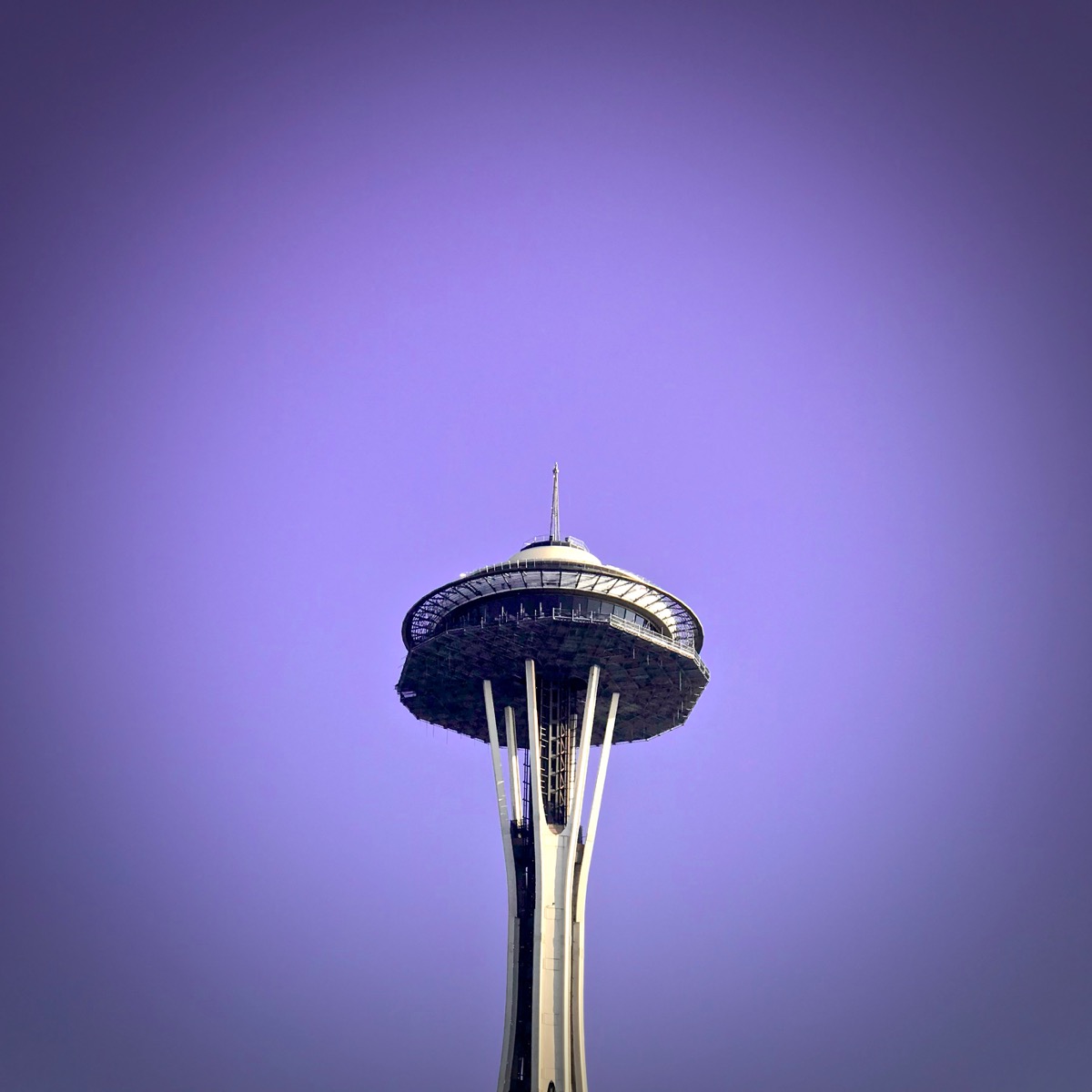
I love the Space Needle, but I kind of love it more like it is right now, under construction. They're updating the place, making the attraction more modern. The restaurant will have a glass floor on the rotating part, and the wire safety around the top will be replaced with clear glass, as well. It's all part of this $100 million renovation to keep the landmark popular for years to come.
During construction a 28,000 pound scaffolding was lifted into place. I think that scaffolding is so cool looking. It looks wrong, which is why I like it. Being so used to seeing the correct Space Needle for so long, to suddenly look up and see it altered somehow gives it an eerie feel.
That platform suspended beneath the observation area and restaurant? It looks like it was hacked into place by a group who took over the needle post-apocalypse, and are holding it as the high ground. They needed more room, so they added a story up top. Below, warring clans break Seattle into no-pass zones. But up high, one group holds the needle, and they're not going to share.
So, let's imagine a future where this is what's happening. And let's imagine that there is one clan that was eager to dislodge the high-minded needle people...
Today's prompts
She had given him a book, an old paperback missing the cover: Romeo and Juliet. She said "it was the most romantic thing the before people made." From his bunk in the needle, he read it over and over, and remembered her face, when he encountered her on the raid. How she hadn't cut him with her knife — she had paused for just a second after seeing him — and he hadn't cut her with his, either. How they saw each other and felt something so electric that it could have cost either of them their life. Then, how they found ways to meet when they could. When he was on duty, say, and she could come and they would go into the old gift shop, now filled with generators and equipment, where there was a private place they could spend some time. And now, how he was finally going to do it when most people were asleep. He was going to escape by the stairs and join her and they were going to leave this ruined city to go live in the mountains.
Nobody could come up with a plan, and it was making Clan Leader Donovan very angry. "The needle people come down and raid our stores, and take it back to the sky! My daughter has run off with one of their pups. And none of you useless fucks has come up with a way to penetrate their defenses!" It was towards the back, the voice came. "I have a way." She stood, a 12 year old. Donovan's youngest daughter. "I have a way, but it will require patience." The men among them started laughing — how could a girl have a plan that could work? A young girl like this? But Donovan knew his daughter, and he shushed them. He knew how her mind worked, and whatever she was thinking, he wanted to hear it. "I got the idea from this book my sister used to have," she said.
Guard duty at night was always boring. She was at the top of the staircase, which meant anybody that got to her had already moved through three other guards, and got through the armored door. She could hear the guards below on the walkie-talkie, chatting about nothing interesting. But then a flash of light from down below. Something happening downstairs? But nothing from the guards down there, everything must be fine. No doubt, it was just a weird reflection. She closed her eyes for just a moment — something she allowed herself on rare occasion, a kind of test to make see if she could keep awake when she was tired — and she remembered the first time she was able to try pancakes. And she realized just how hungry she was at this moment, before she slipped off to sleep.
Sometimes his dad would take him to the roof, and they'd sit on the slope. "They filmed a movie up here once, in the before times, a long time ago. A man fell off the roof, was chased." They looked over the bay, the water lapping at the second story of the buildings by the bay. "Bands played up here once, they'd set fireworks off every year. People would visit from all over." He'd heard all these stories before, of course. "But I brought you up here because you're old enough to know the truth, now. About how we took this needle, and kept it. And about the biggest vulnerability we have." He looked at his dad, and nodded. "What do you think that is?" his dad asked. "Uh," he thought. "Water?" His father smiled and nodded. Proud that his son could figure it out.
Water was the biggest problem. They could run pumps all the day, but they had to keep it in cisterns at the base, where they could scavenge and collect it, or run it through the desalinator if it came from the bay. When they all started getting sick, at first they figured it was a bug going around, but after the first one died they knew it was something else. But they'd always figured the water would be cut off and they'd be held hostage — that's why they guarded the lines so well. They never thought the water would be poisoned, and now they had to come up with a new strategy for how to survive up there on the top of the needle.
Getting ready for Short Run? Read our coverage first!
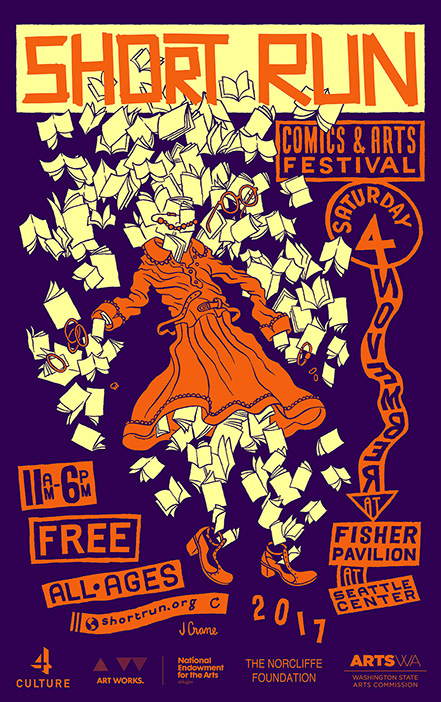
Tomorrow is one of the best days in the literary Seattle calendar year: Short Run happens at Seattle Center, both in the Fisher Pavillion (where exhibitors will be showing thousands of independantly produced books and comics and art) and at the Vera Project (where programming including panels and interviews will play out all day.) It runs from 11 to 6, and it's absolutely free!
But before you go, you might want to learn about some of the authors you'll be able to meet at the show. Here's all of this week's Short Run coverage in one handy place:
Here's our big overview of the show.
We published interviews with exhibitors Daria Tessler and Tyler Wright Rushing.
Christine Marie Larsen immortalized author Emil Ferris, who will be in conversation with Leela Corman and me at the Vera Project at 2 pm.
I reviewed books that are debuting at Short Run by Julia Wertz, Anders Nilsen, and Seattle author Mita Mahato.
In addition to my panel at the Vera Project, The Seattle Review of Books staff will be walking the show at the floor. If you spot any of us, please say hi and tell us about your favorite Short Run finds. See you there!
The Help Desk: Erotica tips from a bag of hair
Do you need a book recommendation to send your worst cousin on her birthday? Is it okay to read erotica on public transit? Cienna Madrid can help. Send your Help Desk Questions to advice@seattlereviewofbooks.com.
Dear Cienna,
I know you're not that other Seattle advice columnist, but here's the thing: I used to read those Nancy Friday books about sexual fantasies all the time. They're, like, the hottest things ever to be published. Now, mostly, I read dirty stories online, but those confessional fantasies remain a kind of bedrock of my sexual imagination.
I'm kind of hooked on this idea of confessional fantasies, and my appetite for them is never ending. I've tried writing dirty notes on Reddit (okay, seriously, Dirty Pen Pals can get pretty steamy, but you have to fend off all the "A girl? A girl? A real girl!?" bull crap.) And, frankly, I have a relationship and I'm not looking for another, I just want to hear other women's dirty inner thoughts. Any suggestions on where I can go to find material?
Nancy, Friday Harbor
Dear Nancy,
Fortunately for you, I still have sandwich bag full of that other advice columnist's hair – a charming remnant of my career as a journalist. Mostly I wave it around at strange homosexuals in bars to prove that I am an ally or use it as bedding for spider nests, however, your question has left me at a loss for weeks now, so I decided to ask the hair.
(Some people will scoff at asking a sandwich bag of old hair for advice but put a microphone in front of it, get it talking about chemtrails and I dare you to tell it apart from popular radio commentator Alex Jones.)
While that Seattle advice columnist is best known as a gay man, only his close friends and family are aware that his hair was proudly lesbian in the late 90s, when these clippings were harvested and bagged. The bag of hair says the problem with female confessional fantasies on the internet is that they're often poorly written and, as you've discovered, are either geared towards the male gaze or interrupted by men. The bag of hair says you should give lesbian romance novels a try – they're written by women, for women, and feature female protagonists focused solely on female pleasure.
Here are a few popular suggestions: Silver Wings by HP Munro, Fated Love by Radclyffe, and Keepers of the Cave by Gerri Hill. And if you want a titillating nonfiction book centered on sexuality and the porn industry, a la Nancy Friday, the bag of hair suggests you try Talk Dirty to Me by Sallie Tisdale.
Kisses,
Cienna
Daria Tessler is coming to Short Run this Saturday
Portland illustrator and cartoonist Daria Tessler is coming to the Short Run Comix & Arts Festival for the second time this year. She makes beautiful illustrations that feel like a blend of children’s book illustrations and 1970s countercultural comics. You can find her booth in the show and she’ll also be performing in The Midnight Variety Hour, described as an “active participatory performance” at the Vera Project at noon.
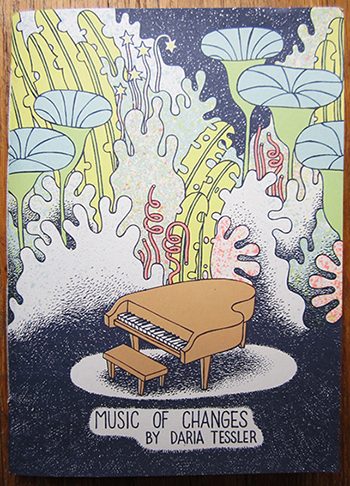
Are you bringing anything new to the show?
Yes, I have Accursed, a book of ancient curses that was lavishly published by Perfectly Acceptable Press earlier this year. It's a 4 color riso book with a snazzy letterpressed cover. I also hope to finish a last-minute minicomic. Plus I'll have a few new silkscreens.
Are there any artists you're excited to see at Short Run this year?
I'm really excited to meet an artist whose Instagram name is abrownrecluse, and whose real name is Jordan, who makes incredible stippled and layered drawings and minicomics. We plan to collaborate on a book project next year.
You've got a comic coming out from Fantagraphics next year! Do you see yourself moving away from minicomics and into the publishing side of things, or are you going to continue with a blend of self-produced and "professionally" published works?
I love hand-making books and printing small run publications using print methods other than offset printing. I'm sure I'll continue to work with those alternate types of bookmaking because they offer a different feel or mood and a special more personal art object. But working with a bigger publisher is great, you can create books that are more affordable to all kinds of readers and they get good distribution and you reach a larger audience. So both seem important to me.
Portrait Gallery: Emil Ferris
Each week, Christine Larsen creates a new portrait of an author for us. Have any favorites you’d love to see immortalized? Let us know
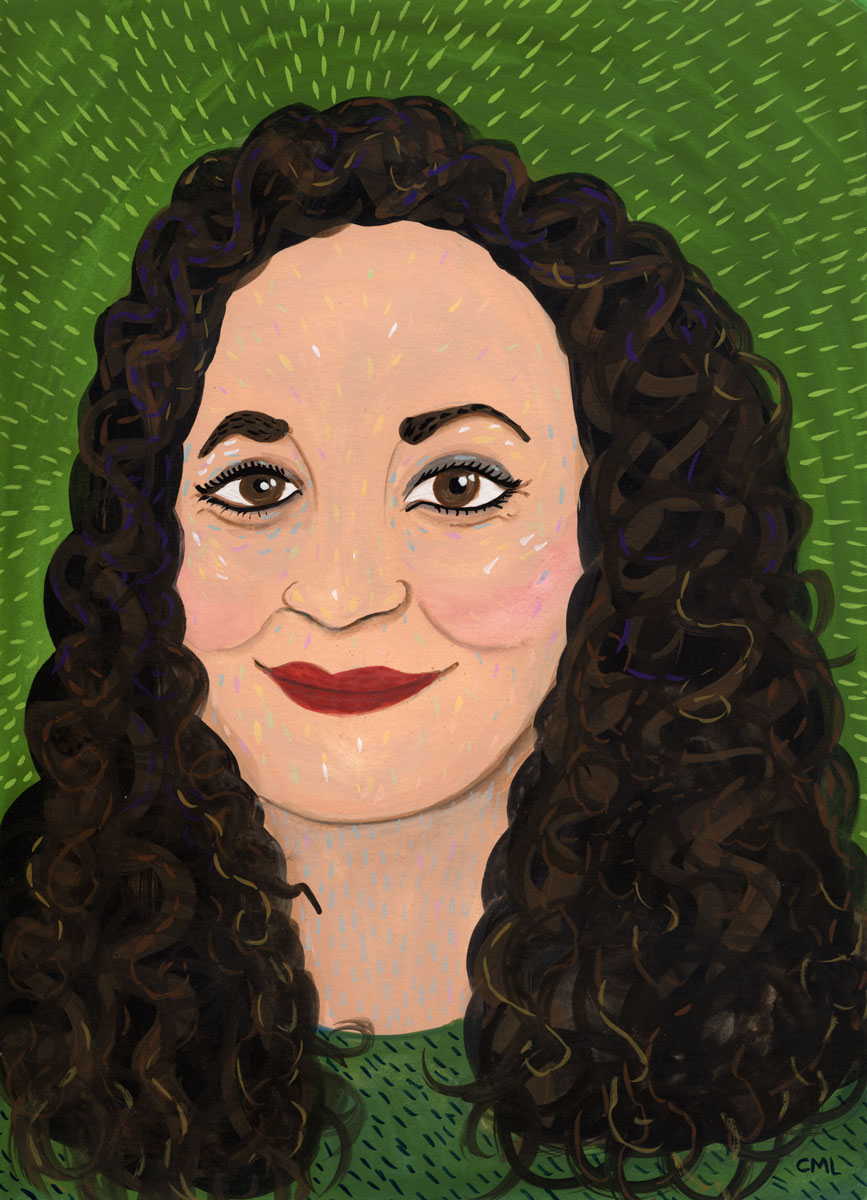
Emil Ferris
This weekend is all about the Short Run Comix and Art show, and Friday is the pre-funk. Short Run all-stars including Emil Ferris, Leela Corman, Julia Wertz, Jordan Crane, Gemma Correll, Tom Hart, nishat akhtar, Rebecca Artemisa, and Anders Nilsen will talk and cavort over refreshments. Several of the artists will share presentations of their work, too.
Friday, November 3rd: Short Run Marathon Art Show & Pre-Festival Party
Fantagraphics Bookstore & Gallery, 925 E. Pike St., 658-0110, http://fantagraphics.com/flog/bookstore, 6 pm, free.
Saturday, November 4th: Emil Ferris in conversation with Leela Corman and Paul Constant. VERA Stage Room, Seattle Center, 2-3 pm, free
Monday, November 6th: Emil Ferris at the UW. Emil will discuss her work and career in the context of disability culture. The discussion will be moderated by José Alaniz, Director of the UW Disability Studies Program.
Odegaard 220, University of Washington Campus, 4-5:30 pm https://www.facebook.com/events/372854903150133/
A city of one
Published November 02, 2017, at 1:03pm
Cartoonist Julia Wertz is a special guest at the Short Run Comix & Arts Festival this weekend. Her latest book is a love letter to New York City, and it's a guidebook for how to fall in love with a city.
